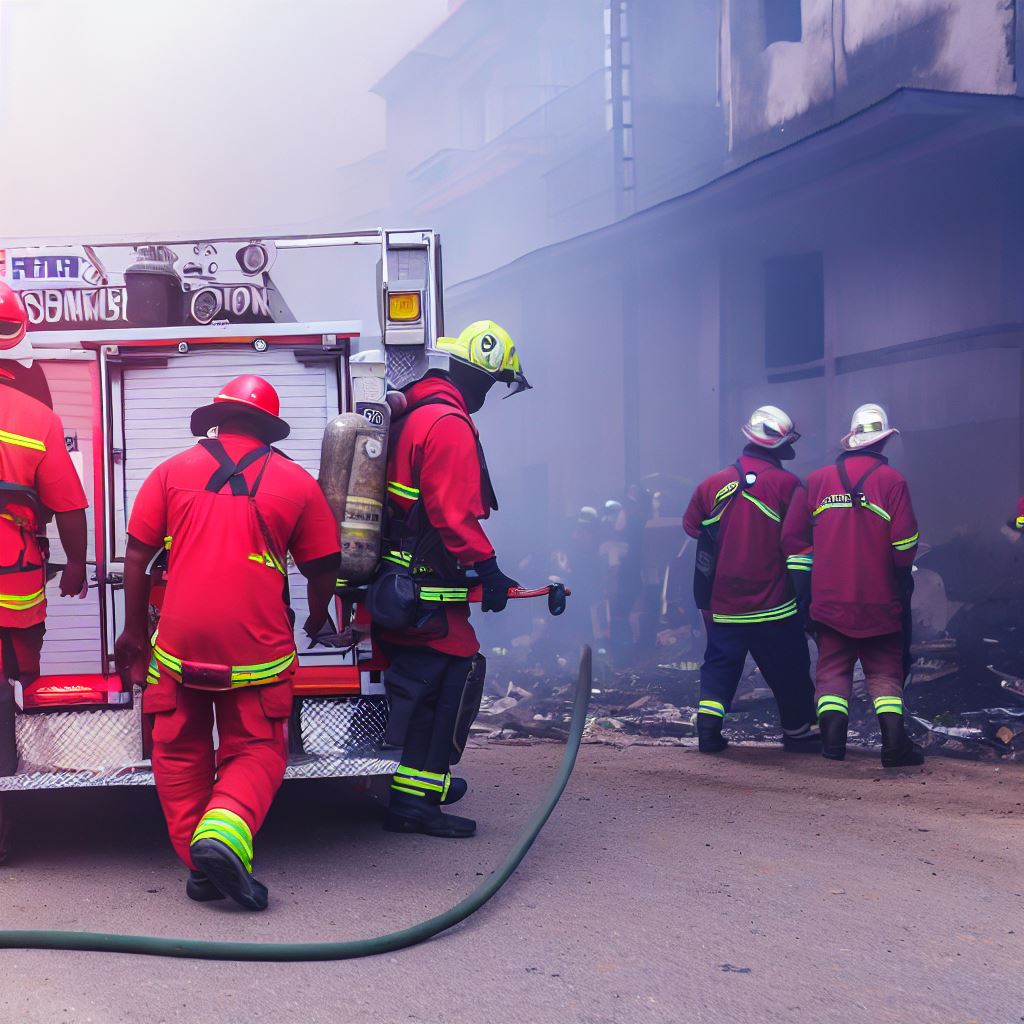Introduction
In the vast tapestry of Nigeria’s challenges, fire incidents have emerged as a recurring nightmare.
These infernos not only lay waste to our communities but also claim precious lives.
However, in our quest to combat these blazes, we must not forget another formidable adversary: the environmental impact of firefighting.
The importance of addressing this issue cannot be overstated. Our firefighting practices, while valiant, often come at a significant environmental cost.
From the chemicals used to suppress flames to the emissions from firefighting vehicles, our environment bears the brunt of our efforts to save lives and property.
This section is dedicated to exploring the often-overlooked consequences of fire suppression.
We will delve into the intricate web of environmental repercussions that accompany firefighting in Nigeria.
By understanding these impacts, we can pave the way for more sustainable and environmentally responsible firefighting practices in our nation.
Causes of Fire Incidents in Nigeria
Fire incidents in Nigeria have multifaceted consequences, extending beyond the immediate damage caused by flames.
One often overlooked aspect is the environmental impact of firefighting efforts.
Traditional firefighting methods typically involve the use of water, foam, or chemical extinguishers.
While these techniques are effective in quelling flames, they can inadvertently harm the environment.
Water runoff contaminated with firefighting chemicals may find its way into nearby water bodies, potentially harming aquatic life and ecosystems.
Moreover, the emissions from firefighting equipment, such as fire trucks and generators, contribute to air pollution.
The release of carbon monoxide and other pollutants during firefighting operations can further degrade air quality, exacerbating existing environmental challenges.
To mitigate these environmental impacts, it’s essential to adopt eco-friendly firefighting strategies.
Implementing advanced firefighting technologies, like foam-based extinguishing agents that are less harmful to the environment, can reduce the ecological footprint of firefighting efforts.
Additionally, proper containment and disposal of firefighting runoff can help safeguard local ecosystems.
As Nigeria strives to address its fire incident challenges, it’s crucial to consider the environmental consequences of firefighting and prioritize sustainable solutions for a greener and safer future.
Traditional Firefighting Techniques
Firefighting in Nigeria has long relied on traditional methods, mainly involving the use of water and sand to quench flames.
While these techniques have been effective to some extent, they come with significant environmental consequences that demand attention.
The prevalent practice of using water to combat fires is deeply ingrained in Nigeria’s firefighting culture.
Firefighters often employ hoses or buckets, drawing water from nearby sources like rivers, lakes, or domestic supplies.
However, this heavy reliance on water has led to severe water shortages in many regions.
During fire outbreaks, multiple sources may need to be tapped simultaneously, straining already limited water resources and jeopardizing drinking water availability, agriculture, and ecosystems.
Additionally, traditional firefighting contributes to land degradation.
The excessive use of water can cause soil erosion and strip away fertile topsoil, exacerbating food security challenges in a country where agricultural land is scarce.
Moreover, these methods release large amounts of smoke and pollutants into the atmosphere, posing health risks to firefighters and nearby communities.
Sand, used as an alternative extinguishing agent, also has its drawbacks. It may not always be readily available, and its transportation can be time-consuming and impractical.
Furthermore, sand can harm vegetation and soil, contributing to environmental degradation.
To mitigate these environmental consequences, Nigeria must explore modern firefighting technologies like fire suppressants, foam-based extinguishers, and fire-retardant clothing.
Simultaneously, comprehensive training programs and awareness campaigns are vital to promote sustainable firefighting practices.
These efforts encompass controlled burns, which reduce fuel loads and prevent large-scale fires.
In fact, the traditional firefighting methods in Nigeria have a significant environmental impact.
Addressing these issues necessitates a transition to more sustainable and innovative firefighting techniques that conserve water, protect land, and reduce air pollution.
Read: Rescue Missions: Fire Fighters Saving Lives in Nigeria
Modern Firefighting Methods and Equipment
Introduction to modern fire extinguishing methods and equipment currently used in Nigeria
Modern fire extinguishing methods and equipment play a vital role in combating fires in Nigeria.
Various advanced technologies and tools have been adopted to enhance firefighting capabilities.
These include high-pressure water systems, advanced foam-based extinguishers, and automated fire suppression systems.
The introduction of these modern methods and equipment has significantly improved Nigeria’s firefighting capabilities.
Firefighters now have access to powerful tools that enable them to handle fire incidents more efficiently and effectively.
How these methods aim to minimize environmental impact
In addition to enhancing firefighting efficiency, modern methods also focus on minimizing their environmental impact.
Traditional firefighting methods often relied on water-based extinguishers, which could lead to water pollution and damage ecosystems.
However, modern methods prioritize the use of eco-friendly fire suppressants and extinguishing agents.
These agents are specifically designed to minimize harm to the environment and reduce the release of toxic chemicals.
Moreover, advanced technologies such as automated fire suppression systems help control fires more swiftly, minimizing their duration and subsequent environmental impact.
Examples of eco-friendly fire retardants and extinguishing agents
Eco-friendly fire retardants and extinguishing agents are gaining popularity in Nigeria’s firefighting efforts.
One notable example is the use of aqueous film-forming foam (AFFF), which is effective in suppressing flammable liquid fires.
AFFF creates a blanket-like barrier that prevents the fire from spreading and re-igniting while minimizing environmental damage.
Another example is the adoption of dry chemical agents that are non-toxic and leave minimal residue after extinguishing a fire.
These eco-friendly alternatives ensure that firefighting efforts do not further contribute to environmental degradation.
Read: Fire Fighter Health and Fitness: Tips in Nigeria

Environmental Challenges in Firefighting
Inadequate Resources
Firefighters in Nigeria face numerous environmental challenges in their line of duty. One key obstacle is the inadequate resources available to them.
Due to budget constraints and limited funding, fire departments often lack the necessary equipment, such as fire trucks, protective gear, and communication systems.
Without proper resources, firefighters find it difficult to effectively respond to emergencies, putting both themselves and the environment at greater risk.
Limited Access to Water
Another significant environmental challenge experienced by Nigerian firefighters is the limited access to water, a crucial element in suppressing fires.
Many areas in Nigeria suffer from water scarcity, making it arduous for firefighters to quickly control and extinguish fires.
Without sufficient water supply, fire incidents can escalate quickly, causing severe damage to the environment and surrounding communities.
Adverse Effects on Firefighting Effectiveness
The impact of these environmental challenges on firefighting effectiveness is profound.
With inadequate resources, firefighters are often forced to combat fires with limited equipment, hindering their ability to contain and extinguish flames efficiently.
This can lead to longer response times, increased property damage, and a greater risk of injuries or fatalities among both firefighters and civilians.
Environmental Preservation at Risk
Furthermore, the environmental preservation efforts are also jeopardized by these challenges.
When firefighters struggle to control fires due to limited resources and water scarcity, the environment suffers from increased air pollution and the destruction of natural habitats.
Uncontrolled fires can release harmful pollutants into the air, affecting air quality and potentially harming human health as well as ecosystems.
Forests, wildlife, and vegetation are also at risk as fires spread uncontrollably, leading to irreversible damage to biodiversity and ecosystems.
Need for Sustainable Solutions
To address these environmental challenges, it is crucial to prioritize sustainable solutions in firefighting practices.
Investments should be made to provide fire departments with adequate resources, including modern equipment and training opportunities for firefighters.
Furthermore, water management strategies, such as the development of alternative water sources and conservation measures, must be implemented to ensure sufficient water supply during emergencies.
Collaboration between government agencies, NGOs, and the local community is essential for the effective implementation of these sustainable solutions.
By prioritizing environmental preservation in firefighting operations, we can protect both human lives and the fragile ecosystems that surround us.
In review, Nigerian firefighters face significant environmental challenges, including inadequate resources and limited access to water.
These challenges have a detrimental impact on firefighting effectiveness and environmental preservation.
To overcome these obstacles, sustainable solutions must be prioritized, such as providing adequate resources and implementing water management strategies.
Collaboration among various stakeholders is crucial in ensuring the protection of both human lives and the environment.
Read: Heroes Behind the Hoses: Nigeria’s Fire Fighter Profiles
Efforts Towards Sustainable Firefighting
Overview of existing initiatives in Nigeria to address the environmental impact of firefighting
- Many initiatives have been undertaken to mitigate the environmental impact of firefighting.
- Initiatives focus on reducing pollution, minimizing water consumption, and using eco-friendly firefighting agents.
- Training programs are also being conducted to educate firefighters on sustainable practices.
- Collaboration between government agencies, NGOs, and firefighting departments is crucial to these initiatives’ success.
Examples of organizations promoting eco-friendly practices and supporting firefighters
- The Nigerian Environmental Protection Agency provides guidelines for eco-friendly firefighting.
- Non-profit organizations like Green Nigeria actively promote sustainable firefighting practices.
- Manufacturers are developing innovative firefighting equipment and agents with reduced environmental impact.
- Local communities and individuals are supporting firefighters with donations and volunteering.
Analysis of the effectiveness and outcomes of these efforts
- Existing initiatives have made significant progress in minimizing the environmental impact of firefighting.
- Water recycling systems and advanced firefighting agents have reduced water consumption and pollution.
- Government policies and guidelines have increased awareness and promoted sustainable firefighting practices.
- Training programs have enhanced firefighters’ skills and knowledge on eco-friendly techniques.
- Collaboration between organizations has improved coordination and resource allocation for sustainable firefighting.
- The efforts have garnered public support and recognition, motivating further action.
In general, Nigeria is actively working towards sustainable firefighting practices to reduce the environmental impact.
Various initiatives and organizations are promoting eco-friendly practices, supporting firefighters, and analyzing the outcomes of their efforts.
The effectiveness of these initiatives can be seen in the reduced water consumption, pollution, and increased awareness among firefighters.
Continued collaboration and support will lead to even more successful outcomes in the future.
Read: Top Fire Fighting Equipment Used in Nigeria Today
Recommendations for Improving Environmental Practices in Firefighting
- Suggestions for implementing environmentally responsible fire safety regulations and policies: Ensure that fire safety regulations prioritize the protection of the environment and encourage sustainable firefighting practices.
- Advocacy for adequate training and resources to enhance eco-friendly firefighting practices: Provide firefighters with comprehensive training on environmentally friendly firefighting techniques and equip them with the necessary resources.
- Encouragement for public awareness and involvement in preventing fire incidents and minimizing environmental impact: Educate the public about fire prevention and the importance of minimizing environmental impact, engaging them in proactive measures.
Gain More Insights: A Day in the Life of a Wind-Turbine Technician in Nigeria
Discover More: Legal Requirements for Hotel Receptionists in Nigeria
Conclusion
In the grand scheme of environmental conservation, the impact of firefighting often gets overlooked.
While it’s undeniable that firefighting is essential for public safety, we must also acknowledge its environmental consequences.
The current environmental impact of firefighting in Nigeria is a topic that warrants attention.
The extensive use of water and chemical fire suppressants can contaminate soil and water sources, posing long-term risks to ecosystems and human health.
Additionally, the combustion of fossil fuels in firefighting vehicles contributes to air pollution and greenhouse gas emissions.
Recognizing the urgency of this issue, it is imperative that we adopt sustainable firefighting practices.
This involves investing in eco-friendly firefighting technologies, minimizing water usage, and embracing renewable energy sources for fire trucks.
A collective effort is needed, with individuals, organizations, and the government working together to mitigate the environmental impact of firefighting.
By doing so, we can ensure the safety of our communities while also preserving our precious environment for future generations.




